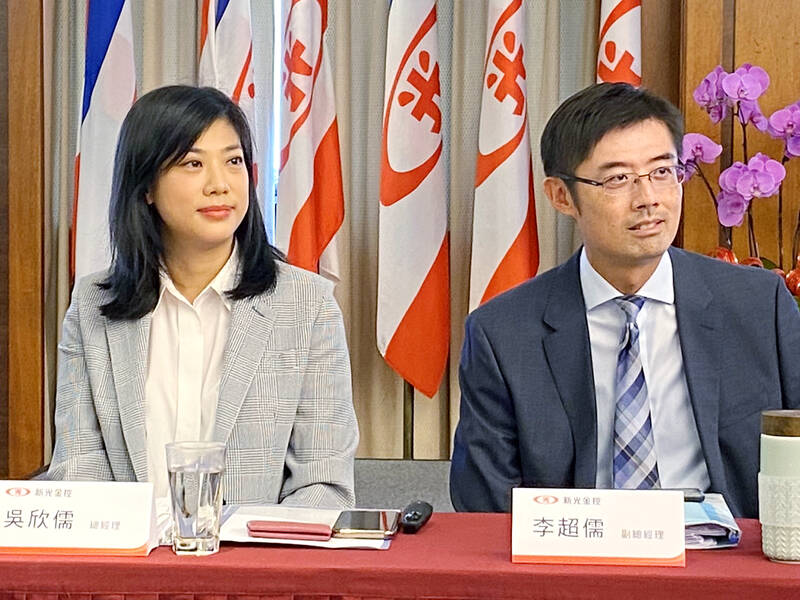The depreciation of the New Taiwan dollar has helped boost investment returns at Shin Kong Life Insurance Co (新光人壽), although its total profits plunged 60 percent annually amid tumbling financial markets, Shin Kong Financial Holding Co (新光金控) told an online investors’ conference yesterday.
The life insurer saw its after-hedge recurring yield rise to 3.77 percent at the end of September, from 2.2 percent a year earlier, and its after-hedge investment return edge up to 3.87 percent from 3.86 percent a year earlier, company data showed.
FOREX GAINS

Photo: Allen Wu, Taipei Times
As the NT dollar has lost value against the US dollar this year, the company in the first nine months generated foreign exchange gains of 0.55 percentage points from its assets denominated in foreign currencies, compared with a loss of 1.75 percentage points a year earlier, the data showed.
Shin Kong Life Insurance invested more in foreign fixed incomes given higher bond yields amid rate hikes, with the ratio of overseas fixed income to its total portfolio rising to 67.3 percent, from 63.7 percent a year earlier, the data showed.
NORTH AMERICAN BONDS
Bonds issued in North America made up 39.7 percent of its total overseas bonds, up from 38.7 percent a year earlier, while European bonds remained flat at about 23 percent and Asian bonds fell to 37.5 percent.
Shin Kong Life Insurance reduced its investment in local stocks, which have tumbled during the first nine months, with the proportion of local stocks in its portfolio sliding from 7.2 percent to 6 percent at the end of September.
Sales of insurance policies denominated in foreign currencies expanded 19.5 percent year-on-year to NT$33.36 billion, accounting for 79.5 percent of all policies, up from a weighing of 78.8 percent a year earlier.
The life insurer said that it would continue to focus on sales of insurance policies denominated in foreign currencies, as such products help it earn more interest spread and reduce its exposure to volatility in the currency exchange rate, it said.
CALL FOR DIVIDENDS
Meanwhile, as Shin Kong Financial’s net profit shrank 52 percent annually to NT$10.37 billion (US$335 million), or earnings per share of NT$0.65, investors at yesterday’s conference asked whether it could distribute cash dividends next year.
The company still has a capital surplus of about NT$18 billion, but it needs to discuss with the regulators whether it could use the funds to distribute dividends, it said, adding that it faces some pressure.

The US dollar was trading at NT$29.7 at 10am today on the Taipei Foreign Exchange, as the New Taiwan dollar gained NT$1.364 from the previous close last week. The NT dollar continued to rise today, after surging 3.07 percent on Friday. After opening at NT$30.91, the NT dollar gained more than NT$1 in just 15 minutes, briefly passing the NT$30 mark. Before the US Department of the Treasury's semi-annual currency report came out, expectations that the NT dollar would keep rising were already building. The NT dollar on Friday closed at NT$31.064, up by NT$0.953 — a 3.07 percent single-day gain. Today,

‘SHORT TERM’: The local currency would likely remain strong in the near term, driven by anticipated US trade pressure, capital inflows and expectations of a US Fed rate cut The US dollar is expected to fall below NT$30 in the near term, as traders anticipate increased pressure from Washington for Taiwan to allow the New Taiwan dollar to appreciate, Cathay United Bank (國泰世華銀行) chief economist Lin Chi-chao (林啟超) said. Following a sharp drop in the greenback against the NT dollar on Friday, Lin told the Central News Agency that the local currency is likely to remain strong in the short term, driven in part by market psychology surrounding anticipated US policy pressure. On Friday, the US dollar fell NT$0.953, or 3.07 percent, closing at NT$31.064 — its lowest level since Jan.

The New Taiwan dollar and Taiwanese stocks surged on signs that trade tensions between the world’s top two economies might start easing and as US tech earnings boosted the outlook of the nation’s semiconductor exports. The NT dollar strengthened as much as 3.8 percent versus the US dollar to 30.815, the biggest intraday gain since January 2011, closing at NT$31.064. The benchmark TAIEX jumped 2.73 percent to outperform the region’s equity gauges. Outlook for global trade improved after China said it is assessing possible trade talks with the US, providing a boost for the nation’s currency and shares. As the NT dollar

The Financial Supervisory Commission (FSC) yesterday met with some of the nation’s largest insurance companies as a skyrocketing New Taiwan dollar piles pressure on their hundreds of billions of dollars in US bond investments. The commission has asked some life insurance firms, among the biggest Asian holders of US debt, to discuss how the rapidly strengthening NT dollar has impacted their operations, people familiar with the matter said. The meeting took place as the NT dollar jumped as much as 5 percent yesterday, its biggest intraday gain in more than three decades. The local currency surged as exporters rushed to